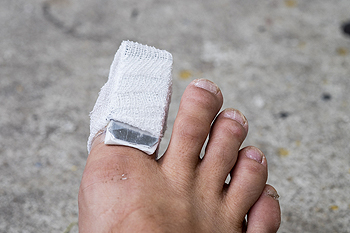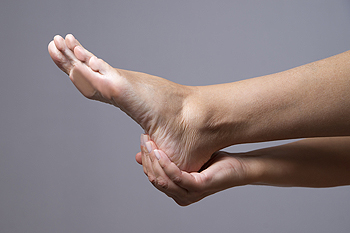Connect With Us
Blog
Items filtered by date: February 2018
It's Time for Beautiful Feet
Common Foot Ailments Resulting From Obesity
 There can be several foot problems that may occur because of obesity. Some of these may include arthritis, skin issues, and general foot pain as a result of the weight the feet must endure. Excessive weight gain may cause a lack of mobility, potentially affecting the ability to perform proper exercises. Occasionally the feet may change sizes, which can affect the width and the arch of the foot. General foot pain may be experienced as the feet strain under body weight. Gout, a type of arthritis, is a common ailment that many obese people suffer from. It is an excess of uric acid that forms crystals in the joints, and in many cases, it may cause inflammation and severe pain. Please consider a consultation with a podiatrist for information about how obesity can be controlled to improve the condition of your feet.
There can be several foot problems that may occur because of obesity. Some of these may include arthritis, skin issues, and general foot pain as a result of the weight the feet must endure. Excessive weight gain may cause a lack of mobility, potentially affecting the ability to perform proper exercises. Occasionally the feet may change sizes, which can affect the width and the arch of the foot. General foot pain may be experienced as the feet strain under body weight. Gout, a type of arthritis, is a common ailment that many obese people suffer from. It is an excess of uric acid that forms crystals in the joints, and in many cases, it may cause inflammation and severe pain. Please consider a consultation with a podiatrist for information about how obesity can be controlled to improve the condition of your feet.
Obesity has become very problematic at this point in time and can have extremely negative effects on the feet. If you’re an obese individual and are concerned about your feet, contact one of our podiatrists from New England Foot and Ankle. Our doctors can provide the care you need to keep you pain-free and on your feet.
Obesity and Your Feet
Since your feet are what support your entire weight when standing, any additional weight can result in pain and swelling. Being overweight is one of the main contributors to foot complications.
Problems & Complications
Extra Weight – Even putting on just a few extra pounds could create serious complications for your feet. As your weight increases, your balance and body will shift, creating new stresses on your feet. This uneven weight distribution can cause pain, even while doing the simplest tasks, such as walking.
Diabetes – People who are overweight are at serious risk of developing type-2 diabetes, which has a drastic impact on the health of your feet. As you get older, your diabetes might worsen, which could lead to loss of feeling in your feet, sores, and bruises. You could also become more prone to various infections.
Plantar fasciitis – Pressure and stress that is placed on muscles, joints, and tendons can trigger plantar fasciitis, which is an inflammation of tissue that forms along the bottom of the foot.
If you have any questions please feel free to contact one of our offices located in Chelmsford and Newburyport, MA . We offer the newest diagnostic and treatment technologies for all your foot and ankle needs.
Common Foot Ailments Resulting From Obesity
 There can be several foot problems that may occur because of obesity. Some of these may include arthritis, skin issues, and general foot pain as a result of the weight the feet must endure. Excessive weight gain may cause a lack of mobility, potentially affecting the ability to perform proper exercises. Occasionally the feet may change sizes, which can affect the width and the arch of the foot. General foot pain may be experienced as the feet strain under body weight. Gout, a type of arthritis, is a common ailment that many obese people suffer from. It is an excess of uric acid that forms crystals in the joints, and in many cases, it may cause inflammation and severe pain. Please consider a consultation with a podiatrist for information about how obesity can be controlled to improve the condition of your feet.
There can be several foot problems that may occur because of obesity. Some of these may include arthritis, skin issues, and general foot pain as a result of the weight the feet must endure. Excessive weight gain may cause a lack of mobility, potentially affecting the ability to perform proper exercises. Occasionally the feet may change sizes, which can affect the width and the arch of the foot. General foot pain may be experienced as the feet strain under body weight. Gout, a type of arthritis, is a common ailment that many obese people suffer from. It is an excess of uric acid that forms crystals in the joints, and in many cases, it may cause inflammation and severe pain. Please consider a consultation with a podiatrist for information about how obesity can be controlled to improve the condition of your feet.
Obesity has become very problematic at this point in time and can have extremely negative effects on the feet. If you’re an obese individual and are concerned about your feet, contact one of our podiatrists from New England Foot and Ankle. Our doctors can provide the care you need to keep you pain-free and on your feet.
Obesity and Your Feet
Since your feet are what support your entire weight when standing, any additional weight can result in pain and swelling. Being overweight is one of the main contributors to foot complications.
Problems & Complications
Extra Weight – Even putting on just a few extra pounds could create serious complications for your feet. As your weight increases, your balance and body will shift, creating new stresses on your feet. This uneven weight distribution can cause pain, even while doing the simplest tasks, such as walking.
Diabetes – People who are overweight are at serious risk of developing type-2 diabetes, which has a drastic impact on the health of your feet. As you get older, your diabetes might worsen, which could lead to loss of feeling in your feet, sores, and bruises. You could also become more prone to various infections.
Plantar fasciitis – Pressure and stress that is placed on muscles, joints, and tendons can trigger plantar fasciitis, which is an inflammation of tissue that forms along the bottom of the foot.
If you have any questions please feel free to contact one of our offices located in Chelmsford and Newburyport, MA . We offer the newest diagnostic and treatment technologies for all your foot and ankle needs.
Read more about How Obesity Affects Your FeetAll About Plantar Fasciitis
Plantar fasciitis affects more than three million people each year. This ailment typically occurs when the foot’s shock absorbing ligament, also known as the plantar fascia, suffers inflammation or small tears from too much tension or stress. The ligament associated with plantar fasciitis runs across the entire bottom of the foot. However, the pain associated with this condition is usually only located within the center of the heel. Some people do tend to experience pain up into their arch, though. Plantar fasciitis can be caused by a variety of occurrences such as jobs that keep people on their feet, stressful exercises, obesity, or wearing shoes with little support. Treatments for plantar fasciitis may include icing your feet, receiving cortisone injections, wearing a specialized boot, and even doing stretches. If you are experiencing any foot pain, an appointment with your podiatrist is highly advised.
Plantar fasciitis can be very painful and inconvenient. If you are experiencing heel pain or symptoms of plantar fasciitis, contact one of our podiatrists from New England Foot and Ankle. Our doctors can provide the care you need to keep you pain-free and on your feet.
What Is Plantar Fasciitis?
Plantar fasciitis is the inflammation of the thick band of tissue that runs along the bottom of your foot, known as the plantar fascia, and causes mild to severe heel pain.
What Causes Plantar Fasciitis?
- Excessive running
- Non-supportive shoes
- Overpronation
- Repeated stretching and tearing of the plantar fascia
How Can It Be Treated?
- Conservative measures – anti-inflammatories, ice packs, stretching exercises, physical therapy, orthotic devices
- Shockwave therapy – sound waves are sent to the affected area to facilitate healing and are usually used for chronic cases of plantar fasciitis
- Surgery – usually only used as a last resort when all else fails. The plantar fascia can be surgically detached from the heel
While very treatable, plantar fasciitis is definitely not something that should be ignored. Especially in severe cases, speaking to your doctor right away is highly recommended to avoid complications and severe heel pain. Your podiatrist can work with you to provide the appropriate treatment options tailored to your condition.
If you have any questions please feel free to contact one of our offices located in Chelmsford and Newburyport, MA . We offer the newest diagnostic and treatment technologies for all your foot and ankle needs.
Read more about Plantar FasciitisAll About Plantar Fasciitis
Plantar fasciitis affects more than three million people each year. This ailment typically occurs when the foot’s shock absorbing ligament, also known as the plantar fascia, suffers inflammation or small tears from too much tension or stress. The ligament associated with plantar fasciitis runs across the entire bottom of the foot. However, the pain associated with this condition is usually only located within the center of the heel. Some people do tend to experience pain up into their arch, though. Plantar fasciitis can be caused by a variety of occurrences such as jobs that keep people on their feet, stressful exercises, obesity, or wearing shoes with little support. Treatments for plantar fasciitis may include icing your feet, receiving cortisone injections, wearing a specialized boot, and even doing stretches. If you are experiencing any foot pain, an appointment with your podiatrist is highly advised.
Plantar fasciitis can be very painful and inconvenient. If you are experiencing heel pain or symptoms of plantar fasciitis, contact one of our podiatrists from New England Foot and Ankle. Our doctors can provide the care you need to keep you pain-free and on your feet.
What Is Plantar Fasciitis?
Plantar fasciitis is the inflammation of the thick band of tissue that runs along the bottom of your foot, known as the plantar fascia, and causes mild to severe heel pain.
What Causes Plantar Fasciitis?
- Excessive running
- Non-supportive shoes
- Overpronation
- Repeated stretching and tearing of the plantar fascia
How Can It Be Treated?
- Conservative measures – anti-inflammatories, ice packs, stretching exercises, physical therapy, orthotic devices
- Shockwave therapy – sound waves are sent to the affected area to facilitate healing and are usually used for chronic cases of plantar fasciitis
- Surgery – usually only used as a last resort when all else fails. The plantar fascia can be surgically detached from the heel
While very treatable, plantar fasciitis is definitely not something that should be ignored. Especially in severe cases, speaking to your doctor right away is highly recommended to avoid complications and severe heel pain. Your podiatrist can work with you to provide the appropriate treatment options tailored to your condition.
If you have any questions please feel free to contact one of our offices located in Chelmsford and Newburyport, MA . We offer the newest diagnostic and treatment technologies for all your foot and ankle needs.
Symptoms of a Broken Toe
 Severe pain is likely to be experienced if you have a broken toe, and it will typically heal within 6 weeks. The toe may be tender, bruised, and swollen, often resulting in difficulty in walking. The treatment for a broken or bruised toe is the same, despite the fact that many people have trouble differentiating between the two. Temporary relief may come from elevating the foot, which generally helps in reducing any pain or swelling associated with this condition. Additionally, choosing to wear shoes that give the toes ample room to move may aid in diminishing any discomfort that may be experienced. If the toe is bent at an unnatural angle indicating a severe break, a consultation with a podiatrist is suggested for ways to properly treat your broken toe.
Severe pain is likely to be experienced if you have a broken toe, and it will typically heal within 6 weeks. The toe may be tender, bruised, and swollen, often resulting in difficulty in walking. The treatment for a broken or bruised toe is the same, despite the fact that many people have trouble differentiating between the two. Temporary relief may come from elevating the foot, which generally helps in reducing any pain or swelling associated with this condition. Additionally, choosing to wear shoes that give the toes ample room to move may aid in diminishing any discomfort that may be experienced. If the toe is bent at an unnatural angle indicating a severe break, a consultation with a podiatrist is suggested for ways to properly treat your broken toe.
A broken toe can be very painful and lead to complications if not properly fixed. If you have any concerns about your feet, contact one of our podiatrists from New England Foot and Ankle. Our doctors will treat your foot and ankle needs.
What to Know About a Broken Toe
Although most people try to avoid foot trauma such as banging, stubbing, or dropping heavy objects on their feet, the unfortunate fact is that it is a common occurrence. Given the fact that toes are positioned in front of the feet, they typically sustain the brunt of such trauma. When trauma occurs to a toe, the result can be a painful break (fracture).
Symptoms of a Broken Toe
- Throbbing pain
- Swelling
- Bruising on the skin and toenail
- The inability to move the toe
- Toe appears crooked or disfigured
- Tingling or numbness in the toe
Generally, it is best to stay off of the injured toe with the affected foot elevated.
Severe toe fractures may be treated with a splint, cast, and in some cases, minor surgery. Due to its position and the pressure it endures with daily activity, future complications can occur if the big toe is not properly treated.
If you have any questions please feel free to contact one of our offices located in Chelmsford and Newburyport, MA . We offer the newest diagnostic and treatment technologies for all your foot and ankle needs.
Symptoms of a Broken Toe
 Severe pain is likely to be experienced if you have a broken toe, and it will typically heal within 6 weeks. The toe may be tender, bruised, and swollen, often resulting in difficulty in walking. The treatment for a broken or bruised toe is the same, despite the fact that many people have trouble differentiating between the two. Temporary relief may come from elevating the foot, which generally helps in reducing any pain or swelling associated with this condition. Additionally, choosing to wear shoes that give the toes ample room to move may aid in diminishing any discomfort that may be experienced. If the toe is bent at an unnatural angle indicating a severe break, a consultation with a podiatrist is suggested for ways to properly treat your broken toe.
Severe pain is likely to be experienced if you have a broken toe, and it will typically heal within 6 weeks. The toe may be tender, bruised, and swollen, often resulting in difficulty in walking. The treatment for a broken or bruised toe is the same, despite the fact that many people have trouble differentiating between the two. Temporary relief may come from elevating the foot, which generally helps in reducing any pain or swelling associated with this condition. Additionally, choosing to wear shoes that give the toes ample room to move may aid in diminishing any discomfort that may be experienced. If the toe is bent at an unnatural angle indicating a severe break, a consultation with a podiatrist is suggested for ways to properly treat your broken toe.
A broken toe can be very painful and lead to complications if not properly fixed. If you have any concerns about your feet, contact one of our podiatrists from New England Foot and Ankle. Our doctors will treat your foot and ankle needs.
What to Know About a Broken Toe
Although most people try to avoid foot trauma such as banging, stubbing, or dropping heavy objects on their feet, the unfortunate fact is that it is a common occurrence. Given the fact that toes are positioned in front of the feet, they typically sustain the brunt of such trauma. When trauma occurs to a toe, the result can be a painful break (fracture).
Symptoms of a Broken Toe
- Throbbing pain
- Swelling
- Bruising on the skin and toenail
- The inability to move the toe
- Toe appears crooked or disfigured
- Tingling or numbness in the toe
Generally, it is best to stay off of the injured toe with the affected foot elevated.
Severe toe fractures may be treated with a splint, cast, and in some cases, minor surgery. Due to its position and the pressure it endures with daily activity, future complications can occur if the big toe is not properly treated.
If you have any questions please feel free to contact one of our offices located in Chelmsford and Newburyport, MA . We offer the newest diagnostic and treatment technologies for all your foot and ankle needs.
Read more about What to Know About a Broken ToeHeel Pain Can Be Treated!
Heel Pain Can Be Treated!
A Diabetic’s Guide to Proper Foot Care
 Foot problems may become more severe if you are a diabetic, and additional care must be taken to avoid complications. There are several techniques that can be practiced for optimum foot care, including checking the feet daily for any cuts or redness, cutting the toenails correctly, and washing and drying thoroughly between the toes. If the skin becomes hardened, you may consider applying a moisturizer on the top and bottom of the feet which will promote softer skin. Choosing to wear shoes that fit well will not only feel comfortable, but will be beneficial in avoiding conditions that may lead to sores and infections. When buying shoes, it’s important to make sure the toes have adequate room to move around, and choosing a shoe with a lower heel may be helpful to avoid falling. It is of vital importance that daily foot inspections be carried out. Any type of wound, especially one that is not healing, must be addressed with immediate attention. A consultation with a podiatrist is advised to learn about the importance of proper diabetic foot care.
Foot problems may become more severe if you are a diabetic, and additional care must be taken to avoid complications. There are several techniques that can be practiced for optimum foot care, including checking the feet daily for any cuts or redness, cutting the toenails correctly, and washing and drying thoroughly between the toes. If the skin becomes hardened, you may consider applying a moisturizer on the top and bottom of the feet which will promote softer skin. Choosing to wear shoes that fit well will not only feel comfortable, but will be beneficial in avoiding conditions that may lead to sores and infections. When buying shoes, it’s important to make sure the toes have adequate room to move around, and choosing a shoe with a lower heel may be helpful to avoid falling. It is of vital importance that daily foot inspections be carried out. Any type of wound, especially one that is not healing, must be addressed with immediate attention. A consultation with a podiatrist is advised to learn about the importance of proper diabetic foot care.
Diabetic foot care is important in preventing foot ailments such as ulcers. If you are suffering from diabetes or have any other concerns about your feet, contact one of our podiatrists from New England Foot and Ankle. Our doctors can provide the care you need to keep you pain-free and on your feet.
Diabetic Foot Care
Diabetes affects millions of people every year. The condition can damage blood vessels in many parts of the body, especially the feet. Because of this, taking care of your feet is essential if you have diabetes, and having a podiatrist help monitor your foot health is highly recommended.
The Importance of Caring for Your Feet
- Routinely inspect your feet for bruises or sores.
- Wear socks that fit your feet comfortably.
- Wear comfortable shoes that provide adequate support.
Patients with diabetes should have their doctor monitor their blood levels, as blood sugar levels play such a huge role in diabetic care. Monitoring these levels on a regular basis is highly advised.
It is always best to inform your healthcare professional of any concerns you may have regarding your feet, especially for diabetic patients. Early treatment and routine foot examinations are keys to maintaining proper health, especially because severe complications can arise if proper treatment is not applied.
If you have any questions please feel free to contact one of our offices located in Chelmsford and Newburyport, MA . We offer the newest diagnostic and treatment technologies for all your foot and ankle needs.
Read more about How to Care for Diabetic Foot



